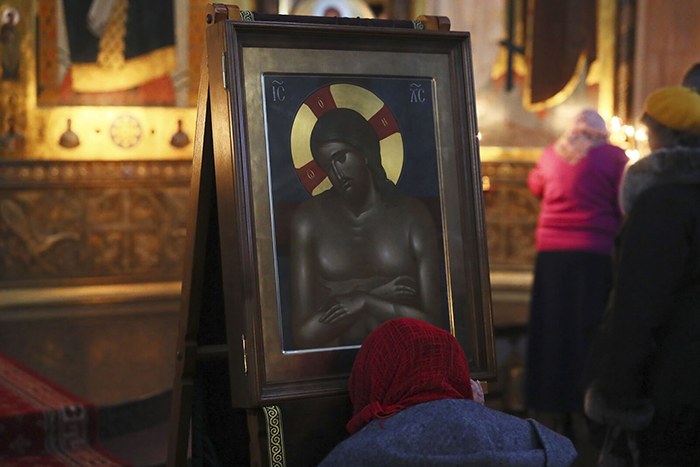
Some go to church several times a year, others do not miss a single service, even when they are ill. Who is closest to the truth?
Reasons for non-attendance
What are the valid reasons for missing a Sunday service? An illness is one, and it is straightforward – we care about our health and the well-being of others.
A busy world schedule that one has no power to change is another.
A third reason not to attend church is caring for a sick person – An elderly parent, child or relative.
We may be unable to come to church because of some emergency that demands our urgent action, like fixing a broken water pipe or a broken door lock. –
In all other cases, a Christian who is free from work and other urgent business should find time on Sunday to come to the church service. Why should we treat it as our duty? Let us first consider why there are so many baptised Christians but so few regular churchgoers among them.
Understanding the Church and our role in it
Most believers misunderstand the idea of the Church. Many see it as a building or structure but fail to recognise its spiritual aspect. Sometimes, we call the church a temple, but these names are not equivalent. In the strict sense, the Church is a community of believers established by Christ. Why do we need to be its members? The Lord Himself gave us an explanation: “Where two or three gather in my name, there I am with them.” (Matthew 18:20). He also said: “I am the vine; you are the branches. If you remain in me and I in you, you will bear much fruit; apart from me you can do nothing.” (John 15:5). In the understanding of the Holy Fathers, Christ calls on us to view the Church as His spiritual body. Like no branch can exist separately from the vine, and no limb can live separately from the body, no Christian can be alive in the spirit without a connection to Christ as a member of His spiritual body.
What are some other reasons to come to church? As we read in the Book of Acts, the first Christians maintained the spirit of unity by gathering every evening for the agape meal, or the Eucharist. We come to Church to participate in the Sacraments, and the Holy Communion, or the Eucharist, is the first among them. It is central to any liturgy. We also come to church to pray communally. We could not achieve the same level of unity by praying privately in our homes.
In his epistle to the Ephesians, Apostle Paul likens the relationship between Christ and the Church to marriage. It is unusual for the partners in a marriage to meet only once a year; likewise, it makes little sense for Christians to meet Christ only on rare occasions. We all form the body of the Church. To keep our unity of the spirit, we need to come to church at least on Sundays.
On Sundays, we remember the resurrection of Christ. It is a joyful day when even the normally strict rules of the Great Lent are relaxed. All Christians should remain in conversation with Christ, and treat it as their priority. As the Holy Martyr Cyprian of Carthage wrote, “To whom the Church is not a mother, the Lord is not the Father”.
Concern for the well-being of others
People with no appreciation of these arguments will likely see no purpose in going to Church regularly and frequently. They might be content with a few visits per year on the great feast days. Conversely, some Christians might go to another extreme – attending every service, even when they are ill. They should reconsider, because someone with an illness may spread the illness to others. Because the use of protection such as masks or gloves does not eliminate all the risks, staying home is the best choice. Some believers with an illness come to take communion for the health of their spirits and bodies, Their motives are understandable, but still do not justify coming to church in illness. A better solution would be to ask a priest to perform the communion at home. That will reduce the risk of infecting the priest and the laity.
Throughout the pandemic, many believers have protested against the restrictions and were upset when the Church insisted on compliance. Yet this position of the Church is not new. Precautions during epidemics have been used at Church before, as we read in multiple writings of the Church Fathers, such as Saint Nicodemus of the Holy Mountain. In the times of Christ, it was also common practice to isolate the sick from the healthy. For example, people with leprosy – for which no cure existed – were isolated from the healthy. Furthermore, the priest had the authority to decide on the isolation of a church member, which was in dispute. In the Scripture, we read about the Lord who healed several people with leprosy and asked them to see the priest; that way, He observed the rules of his time. In our time, it is still appropriate to take the risks of infections seriously, without arrogance or over-reliance on the Lord, remembering His warning that it is wrong to tempt our Lord.
Can we imagine the situations in which people should go to church despite their illness? One example is people with depression, anxiety, phobias and other mental health problems. At Church, many of them will find peace and reassurance. We should also urge ourselves to go to church when we are wrathful, restless or apprehensive.
Is our unwillingness to pray a good reason to skip Church?
At times, most Christians feel fatigued and too exhausted to pray or worship. Some might find staying at home to be the best idea in these situations. But Archimandrite John (Krestyakin) taught that forcing oneself to pray is itself a feat of asceticism. I think that he is right. We should urge ourselves to go to church exactly when we do not feel like doing it. But in the prayerful atmosphere of the church, we will find reassurance. We all have our moments of crisis or despair when it is critical not to allow ourselves to withdraw into ourselves or take liberties. Instead, we should urge ourselves to go to church to reinforce our spirits and mobilise our wills. We fall into despair when our faith becomes weak, and we let ourselves become hostage to our problems or go into a depression. At these moments of weakness, we benefit from sharing our concerns with the Lord in the simplest terms. –
Some people who are depressed, desperate or in difficulty neglect to take the communion because they cannot get themselves to prepare for it. Be sure to talk about your situation with a priest. Together, you will decide on the appropriate amount of preparation. However, it is always best to adhere to the rule. Completing the rule, of course, is not a ticket to communion. It is only a means to arouse in ourselves the spirit of prayer. Some details, however, need to be decided with a priest Who will make accommodations based on your situation.
Overall, there are few good reasons not to come to church. Worship services are our meeting with God. Let us all find a way to attend and partake in the shared joy.
Translated by The Catalogue of Good Deeds
Source: https://pravlife.org/ru/content/chetyre-prichiny-ne-idti-na-bogosluzhenie




